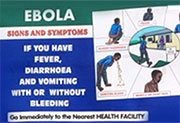- Could Your Grocery Store Meat Be Causing Recurring UTIs?
- Are You Making This Expensive Thermostat Error This Winter?
- Recognizing the Signs of Hypothyroidism
- 10 Strategies to Overcome Insomnia
- Could Artificial Sweeteners Be Aging the Brain Faster?
- Techniques for Soothing Your Nervous System
- Does the Water in Your House Smell Funny? Here’s Why
- Can a Daily Dose of Apple Cider Vinegar Actually Aid Weight Loss?
- 6 Health Beverages That Can Actually Spike Your Blood Sugar
- Treatment Options for Social Anxiety Disorder
Trust Is Key to Curbing West Africa Ebola Outbreak, Study Finds


Gaining peoples’ trust is key to efforts by health workers to rein in the Ebola epidemic in West Africa, a new study suggests.
The study found that a lack of trust among the affected people of Guinea was a major reason the Ebola outbreak got out of control early on.
Distrust led people to ignore medical advice, resulting in the rapid spread of the disease, said a team led by Timothy Robertson of the department of international health at Johns Hopkins Bloomberg School of Public Health in Baltimore.
“This is a nation where many people are hesitant to seek health care at the best of times. Suddenly, people are being told not to touch their sick children and to come to health facilities as soon as they have a fever,” Robertson said in a Hopkins news release.
The Ebola outbreak is currently affecting four West African countries: Guinea, Liberia, Mali and Sierra Leone. According to the World Health Organization, over 14,000 cases have been recorded and more than 5,000 people have died.
Robertson and his colleagues interviewed 41 Red Cross workers based in Guinea’s southern border with Sierra Leone where the Ebola outbreak began last winter.
In many villages, people did heed Red Cross messages about Ebola — guidelines that can help save lives and curb the spread of disease. Those messages included how to identify Ebola symptoms and to go to a health facility if symptoms appeared; to isolate and avoid touching anyone who is sick; and to not handle the bodies of the dead.
However, others refused to listen, the Red Cross workers said. Many were skeptical that Ebola existed, or they believed it was a ploy to get humanitarian aid for their poor nation, or they considered it a foreign plot to steal body parts.
If there had been more trust between the public and the health system, it’s likely that vital information about Ebola and how to prevent its transmission would have gotten through to people much sooner and slowed the spread of the deadly disease, Robertson said.
“We assume as health professionals that everyone is just going to follow our advice, that we can fight these things with our intelligence and resources,” he said. “But it’s not irrational that they chose to ignore the advice. Unless we appreciate how difficult it is for families to follow the guidance we give them, our Ebola control plans look wonderful on paper, but they’re going to fail.”
Going forward, stronger and more trusting relationships between the public and health systems need to be created in West Africa and other areas, he said.
“In order to control the current outbreak and prevent similar ones in the coming decades, health professionals in Guinea and other countries must take urgent steps to cultivate the confidence of community members in the health system and in emergency responders,” Robertson said.
The study was to be presented on Monday in New Orleans at the annual meeting of the American Public Health Association.
More information
The World Health Organization has more about Ebola.
Source: HealthDay
Copyright © 2026 HealthDay. All rights reserved.










